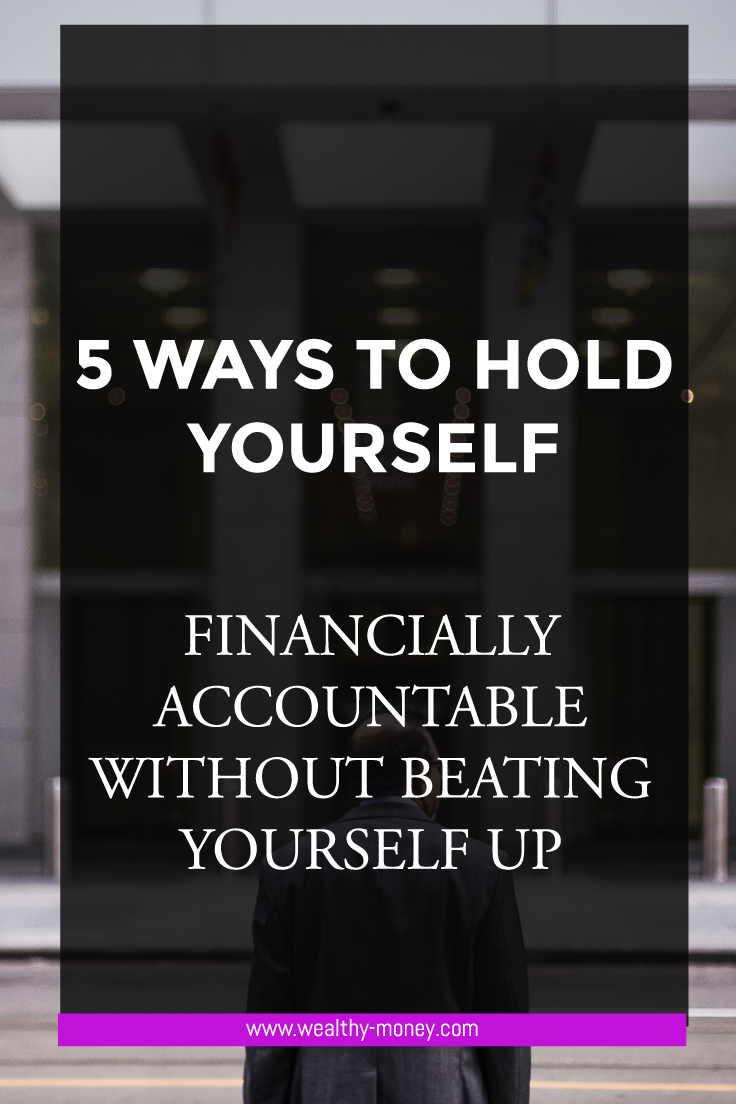5 Ways to Hold Yourself Financially Accountable without Beating Yourself Up
How would your finances look if you held yourself financially accountable and did what you said you were going to do, when you said you’d do it?
The first thing I did when I decided to get out of debt was commit to becoming more financially accountable to myself, not just others.
That meant paying off the debts I promised myself I was going to pay, when I said I was going to pay them.
It also meant saving the amount I’d committed to save every month, no matter what.
the costs being financially unaccountable are too high
1. Increased debt
I used to justify unnecessary spending to myself all the time.
But at some point I eventually admitted that every time I spent money and justified it to myself, the fact still remained that I’d spent the money. And the equation remained the same:
Spending Money + Justification = Increased debt
This kept me in debt and no increase in income could help me. In fact, the more money I made, the less I saved and the more indebted I became.
My financial habits were turning me into my own worst enemy.
2. Decreased return on investment
The upside of holding myself financially accountable means that I now set time lines for my goals and I’ve become very clear that I’m a long term investor.
My lack of financial accountability led me to use my investments like my bank accounts – I’d cash out whenever I needed money, which meant that my investments never got the opportunity to grow.
If the promises you make yourself mean nothing to you, then you’ll never do what you said you’d do as an investor. Good investors always stick to their investment criteria.
3. Bad credit due to late payment
In addition to overspending, I’d also justify not paying my expenses and credit cards on time.
I’d convince myself that it was okay to pay late as long as I paid….eventually.
So of course my expenses would increase and interest would increase and before I knew it, I was dealing with a mountain of debt and a very low credit score.
Paying your debts when you said you were going to pay them is not just good financial management – it’s integrity
How to be financially accountable
1. Align your financial expenses to your values
Set the intention to be the kind of person that lives by their word and start being selective about how you spend your money.
My lack of financial accountability came from wanting everything and wanting to own everything, without a clear understanding of what my values were.
And because I had no idea what my values were, I was spending my money on everything.
2. Get an accountability partner
An accountability partner helps you keep a commitment and can give you the support you need to remain on track with your financial goals. It’s easy to lie to ourselves about our finances but it’s not as easy to continuously lie to someone else.
This is why I host intention circles and have mastermind groups – so I have people I can meet with every month to share my goals and discuss my progress financially and emotionally.
This also makes the journey more enjoyable and fun because you have people to celebrate with when you reach a milestone.
3. Create a budget and stick to it
Once you know where your money is going, make a decision about what you need to change. Look at different parts of your life like recreation, health and daily operations and decide how much of your money you’re going to spend in each area.
A budget is a powerful and can help you remain committed to your goals by helping you spend money on the things you know you can afford.
4. Create a fun account
The reason we have a hard time sticking to a budget is because we have such strict budgets and force our lives to fit into a budget instead of focusing on ways to make our budgets fit our lives so they can reflect what we truly desire.
I’d often find myself frustrated with money and hating money and feeling like I never had enough money because I had to follow this budget that reduced my whole life to a routine of saving and working to pay off debts and expenses.
My budget would suck all the joy out of life and eventually, half way through the month, I’d rebel and start spending money recklessly because it made me feel better and less restricted.
5. Break your financial goals into bite-size pieces
As important as it is for us to have a financial vision, it’s even more important to break our financial vision into bite size pieces with clear action plans.
In the Creating Money Magic Course we focus on crafting a large and then spend the rest of the course breaking it down to annual goals, 3 month goals and eventually daily actions.
A large vision can make us feel overwhelmed and the more overwhelmed we feel, the more likely we are to stop taking action and the less likely we are to hold ourselves accountable.
The Chinese have a saying: "the journey of a thousand miles begins with a single step".
To walk thousand miles, you have to start walking now by putting one foot in front of the other.
The journey to financial freedom is the same – to achieve financial freedom you have to start where you and start working with the money you have right now.
Hold yourself accountable, no matter how little money you make or how large your debts are.
How do you hold yourself financially accountable?
Live Your Best Life, Create Wealth With Intention

Get your FREE copy of the Creating Intentional Wealth Workbook and start now!






